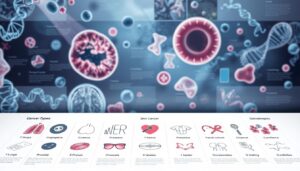As we age, our brains face challenges that can change our lives. Alzheimer’s disease is a major concern, causing dementia symptoms that affect us and our loved ones. Finding Alzheimer’s early is key to managing its effects.
Memory loss is a big sign of Alzheimer’s, along with other early symptoms. With millions in the US facing Alzheimer’s, knowing the early signs is vital. This knowledge helps us care for those affected better.
Learning about Alzheimer’s and dementia symptoms is the first step in managing them. Below, we’ll share important information to help you spot early signs and take action.
Key Takeaways
- Alzheimer’s disease is a leading cause of cognitive decline and a form of dementia that requires close attention.
- Dementia symptoms are varied, but early detection can lead to better management and outcomes.
- Memory loss is often one of the first signs of Alzheimer’s and can signal the need for medical consultation.
- Being informed about the early symptoms empowers individuals and families to seek necessary support and interventions.
- Awareness and empathy play significant roles in understanding and addressing the needs of those affected by Alzheimer’s and dementia.
Understanding Alzheimer’s and Dementia

Learning about “dementia” and “Alzheimer’s disease” is key to understanding cognitive disorders. These terms are often mixed up, but they mean different things. This part will explain what Alzheimer’s is, show the different types of dementia, and why early detection is so important.
Defining Dementia and Alzheimer’s Disease
Dementia is a wide term that covers many types of dementia, like Alzheimer’s disease. It affects memory, thinking, and social skills a lot. Alzheimer’s disease is the most common type. It harms parts of the brain that handle thought, memory, and language.
Key Differences and Misconceptions
It’s important to know that not all dementia is Alzheimer’s disease. Alzheimer’s is a specific disease, but dementia is a broader term. It includes many conditions that affect memory or thinking skills.
The Importance of Early Detection
Finding signs of Alzheimer’s and other cognitive disorders early is vital. Early diagnosis helps people get the most from treatments. It also helps manage symptoms and plan for the future. Early detection greatly improves life for patients and their families.
Early Signs and Symptoms of Alzheimer’s
Spotting Alzheimer’s early is key to managing it. This part talks about the main signs of Alzheimer’s. It looks at how it affects thinking and daily life.
Memory Loss That Disrupts Daily Life
Short-term memory loss is a big sign of Alzheimer’s. It’s not just forgetting things. It’s a lasting problem that gets worse over time. It makes it hard to remember new things.
People might ask the same questions over and over. They might forget important dates or events. They might need help with things they used to do by themselves.
Challenges in Planning or Solving Problems
Those with Alzheimer’s find it hard to plan and solve problems. They might struggle with managing money or following a recipe. They might also take a lot longer to do things.
This shows a big change in how they think.
Difficulty Completing Familiar Tasks
As Alzheimer’s gets worse, people have trouble with everyday tasks. They might have trouble driving or remembering game rules. They might also struggle with managing money at work.
This shows they can’t do things they used to do easily.
Knowing these signs helps spot Alzheimer’s early. It lets people take action and plan for the future. Early detection is important for slowing the disease and improving life quality.
Recognizing Dementia Symptoms
As dementia moves through its stages, it’s key to spot symptoms early. We need to know the dementia signs, behavioral symptoms, and orientation challenges. These are all part of the disease.
Communication and Language Difficulties
In the later dementia stages, talking becomes hard. People might struggle to find words, repeat themselves, or not get complex sentences. This is tough for the person, their caregivers, and loved ones.
Confusion With Time or Place
Those with dementia often get lost in time and place. They might forget dates, seasons, and even how much time has passed. They also get lost in familiar places, making them seem like mazes.
Changes in Mood, Behavior, and Personality
Dementia also changes how people feel and act. They might quickly change moods, get irritable, or pull back from social events. Knowing these changes helps in managing the disease better.
Knowing the dementia stage helps in choosing the right care and support. The table below shows what changes happen at different stages of this neurodegenerative disease.
| Stage | Communication Ability | Orientation Capability | Behavioral Changes |
|---|---|---|---|
| Early | Mild difficulty with word-finding | Occasional confusion with dates | Slight mood swings |
| Middle | Significant challenges in forming sentences | Frequent disorientation in new environments | Noticeable withdrawal from social activities |
| Late | Severe communication loss | Consistent unawareness of time/place | Major shifts in personality, possible aggression |
AlzheimeraDementia: The Crucial Impact on Patients and Families
Alzheimer’s and dementia affect more than just the patients. They also deeply impact their families and caregivers. The emotional, financial, and social effects can be huge. It’s key to understand the Alzheimer’s impact and use effective dementia care, caregiver support, and family coping strategies to help.
Family members often become caregivers, which can be very hard. It can affect their careers, personal lives, and mental health. Getting professional help in dementia care is very important.
There’s a big need for caregiver support programs. These programs help share the caregiving tasks. They offer both practical help and emotional support to families. Also, having strong family coping strategies helps create a caring environment for both caregivers and patients.
Studies show that caregivers often feel very stressed and tired. This can harm their health over time. Organizations and communities need to provide the right resources and breaks to keep caregivers healthy and effective.
- Access to professional counselling and support groups
- Training on managing the everyday challenges of dementia
- Financial and legal assistance to manage the costs of dementia care
Working together to support families with Alzheimer’s and dementia is important. It shows our values as a society. How we handle the impact of Alzheimer’s on families shows our commitment to everyone’s dignity and well-being.
Prevention and Management Strategies
Starting early with Alzheimer’s prevention and dementia management can greatly improve cognitive health. It leads to a brain-healthy lifestyle. This part talks about lifestyle changes, therapeutic interventions, and the latest in treatments. It also stresses the need for support for families facing these challenges.
Keeping your mind sharp involves making lifestyle changes. These changes can lower risks and maybe even delay Alzheimer’s. A big part of staying brain-healthy is doing activities that challenge your mind. Research shows that mental exercises can build a mental reserve and slow symptom progress.
In the field of medications and treatments, new therapeutic interventions are emerging. These options help manage symptoms or slow the disease’s progression. Though they don’t cure Alzheimer’s, they can greatly enhance life quality by easing symptoms and improving thinking skills.
Support networks play a crucial role in dementia management. Families and caregivers can find numerous resources for daily care and coping tips. It’s vital for patients and families to stay updated on the latest treatments and join supportive communities.
In summary, a combination of a brain-healthy lifestyle, effective therapeutic interventions, and strong support networks is essential. They form the foundation for managing Alzheimer’s well, supporting both patients and their families.
Conclusion
Exploring Alzheimer’s and dementia, we see the importance of awareness and support. Knowing the signs is crucial for improving lives. Research and advocacy empower families to seek help and manage their situation.
Early detection is key to easing the burden on patients and families. Education helps spot symptoms early, leading to better care and outcomes. Supporting a loved one with these diseases is tough, but awareness brings moments of connection and understanding.
Our work in Alzheimer’s research, awareness, and advocacy can change millions of lives. Despite the challenges, we can overcome them with resilience and innovation. Every step towards better dementia support moves us closer to a future where cognitive health is a priority for all.
FAQ
Q: What are the early signs of Alzheimer’s?
A: Early signs of Alzheimer’s include memory loss that affects daily life. It also includes trouble with planning and solving problems. You might find it hard to complete tasks you used to do easily.
Confusion about time or place is another sign. Mood and personality changes are also common.
Q: How does dementia differ from Alzheimer’s?
A: Dementia is a term for symptoms of cognitive decline. Alzheimer’s is the most common type, making up 60-80% of cases. Other types, like vascular dementia and Lewy body dementia, have their own characteristics.
Q: Why is early detection of Alzheimer’s and dementia important?
A: Early detection is key because it allows for timely intervention. This can manage symptoms better, slow disease progression, and improve life quality.
Q: Can lifestyle changes reduce the risk of Alzheimer’s and dementia?
A: Yes, research shows lifestyle changes can help. Eating well, staying active, doing cognitive training, and staying socially engaged may reduce risk.
Q: What support resources are available for families dealing with Alzheimer’s or dementia?
A: Many resources support families. There are community groups, online forums, and nonprofits like the Alzheimer’s Association. Local health services offer counseling and respite care.
Q: Are there medications available to treat Alzheimer’s or dementia?
A: Yes, there are FDA-approved medications for symptom management. There’s no cure yet. These treatments aim to improve quality of life and slow symptom progression.
Q: How do Alzheimer’s and dementia symptoms progress over time?
A: Symptoms progress differently for everyone. They often get worse over time. This can lead to more memory loss, task difficulty, and changes in behavior and personality.
Q: What is the impact of Alzheimer’s and dementia on patients and their families?
A: Alzheimer’s and dementia have a big impact. They affect emotions, finances, and social lives. Caregiving is demanding, and families face challenges in adjusting to their loved one’s changing needs.




